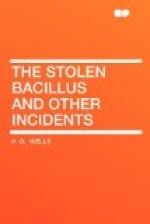He stopped abruptly. He had been told rhetoric was his weakness.
“But he is quite safe here, you know—quite safe.”
The pale-faced man nodded. His eyes shone. He cleared his throat. “These Anarchist—rascals,” said he, “are fools, blind fools—to use bombs when this kind of thing is attainable. I think—”
A gentle rap, a mere light touch of the finger-nails was heard at the door. The Bacteriologist opened it. “Just a minute, dear,” whispered his wife.
When he re-entered the laboratory his visitor was looking at his watch. “I had no idea I had wasted an hour of your time,” he said. “Twelve minutes to four. I ought to have left here by half-past three. But your things were really too interesting. No, positively I cannot stop a moment longer. I have an engagement at four.”
He passed out of the room reiterating his thanks, and the Bacteriologist accompanied him to the door, and then returned thoughtfully along the passage to his laboratory. He was musing on the ethnology of his visitor. Certainly the man was not a Teutonic type nor a common Latin one. “A morbid product, anyhow, I am afraid,” said the Bacteriologist to himself. “How he gloated on those cultivations of disease-germs!” A disturbing thought struck him. He turned to the bench by the vapour-bath, and then very quickly to his writing-table. Then he felt hastily in his pockets, and then rushed to the door. “I may have put it down on the hall table,” he said.
“Minnie!” he shouted hoarsely in the hall.
“Yes, dear,” came a remote voice.
“Had I anything in my hand when I spoke to you, dear, just now?”
Pause.
“Nothing, dear, because I remember—”
“Blue ruin!” cried the Bacteriologist, and incontinently ran to the front door and down the steps of his house to the street.




